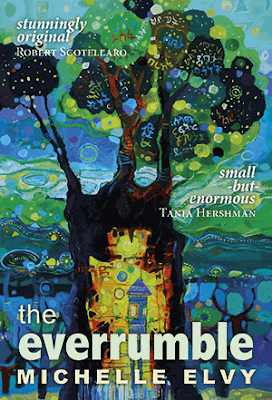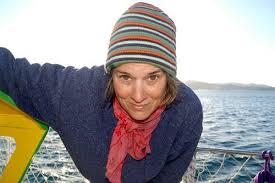One of the
many beauties of The
Everrumble
is its overt
independence
from sequence, without
confusion.
I
don’t recall previously reading a novel in which events hop around
the calendar so willy nilly. Yet,
in retrospect it
is obvious the subtext of
Michelle Elvy’s short novel (132 pages)
has its own linear integrity
corresponding
neatly with the awakening curiosity for an idea so unusual and subtly
crafted there are moments one must remind oneself to breathe.
Everrumble’
s
ingeniously compressed story spans all 105 years of Marjorie Hanna’s
life—from her very first gasp to her final, silent thought. The
name “Marjorie Hanna” has now appeared twice as many times in
this review as it does in the novel. I include it here only to give
to Zettie a conventional perspective, however fleeting, as she may
well be the oddest human being ever portrayed in literary fiction.
The name
“Zettie” comes
about on Marjorie’s second birthday. Her Aunt Zettie has
given her a blanket. During the birthday festivities Marjorie’s
five-year-old brother Brent
“pointed back and forth between Auntie and his sister and said, Big
Zettie, Little Zettie. Little
Zettie wore the blanket on her head all day and
the name stuck.” Five years later, on her seventh birthday, she
makes two decisions:
to talk no more, for any reason, and to stay under the blanket, where
she spends the rest of the year.
She
spends the rest of her life living richly and wondering at the
special gift she’d accepted at birth. On her last day, ninety-eight
years after she stopped talking in order to listen to the sounds no
one else could hear, understanding comes to her.
“The moment of clarity comes in the morning, and it is later in the
day, just before the rapid darkening that is the tropical night, that
she will die.
“It’s
not so much a vision as a full-on worldly orchestral movement.
Overtones and undercurrents. Chantings and crashings. Rowdy and
dreadful but also melodious and beautiful. It happens in a flash,
yes, but its layers are as deep as oceans, as wide
as the space between stars...”
Her
special gift arrives at the moment of her birth. A screaming no other
person in the world hears. It
drifts
in through the open hospital window and vibrates
her timpanic membrane. Of
course the newborn
has
no way of identifying this
sound, because
“how
can you identify anything over the suckingslurpingslipping
surroundsound of your own
birth?”
Soon other sounds reach her. A
bee buzzing across town in a garden, a toad croaking in a pond miles
away, someone coughing on the other side of the world. At age five
she senses these sounds seek her out, and she does her best to
listen. But there’s something else besides the random buzzes and
voices that reach her ears. It’s a
low rumble.
“It
bores gently into her ear and winds down the canal, vibrating through
her whole body, her throat, her chest, her tummy. It moves out to the
tips of her limbs, to the very ends of her long brown hair. Once she
hears it she can’t un-hear it.
“The
rumble is here to stay.”
We
peek in on Zettie at different stages of her life. By age twelve
she’s learned to narrow her focus on the origin of individual
sounds. Hearing a mosquito flying through a broken screen three
streets away, she counts the wingbeat: 111 times per
second.
At
fifteen, her uncle forces
himself on her. She knew he trusted she wouldn’t talk.
Her silence follows him. To his job, to his weekly poker game, and
when he dies three years later she hurls her silence at him “one
last time, screaming down his ear.”
Once
she stops talking, the
absence of verbal
distractions heightens
Zettie’s
other senses, especially her
ability to concentrate. Words fascinate her. She reads
widely, goes to college,
studies languages, graduates with high honors. She still doesn’t
speak the languages, but she understands them, and makes a career of
translating new editions of literature. She travels widely, living
here and there, never staying more than a few years in any one place.
She marries and has two daughters. She and her husband eventually go
their separate ways. She raises their daughters alone.
but maintains “a loving
distance relationship” with their father.
In
a journal she notes the only time she wanted to speak aloud was to
read to children. This was before her daughters were born, and we do
not know if in fact she read to them when they were small. Presumably
not, because surely that would be a highlight in her story, and we
are not privileged to know. I do know Zettie, though, feel I’ve
known her all her life. And I feel she knew me, as well. She knew us
all, one way or another. At the very end we learn what she concludes
of
the
everrumble:
“The
heartbeat of every living creature.” So
loud it hurts
her ears. “They’ll soon
start bleeding. And why not? Her form will turn to liquid, then dust.
Blood is just blood. It’s nothing. It’s nothing.
“Her
skin is dancing. Telling the story of the world.”
Michelle
Elvy is an editor and widely published writer of poetry, fiction, and
creative nonfiction. The
Everrumble
is her first novel. She
lives in New Zealand, and is an avid sailor.


No comments:
Post a Comment